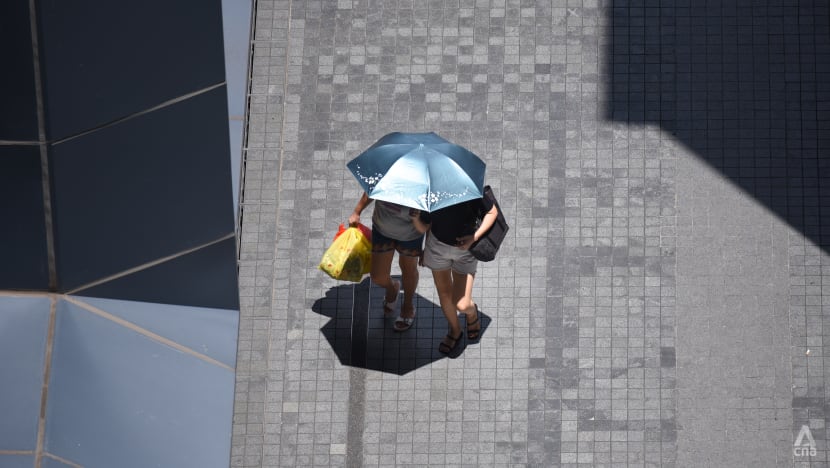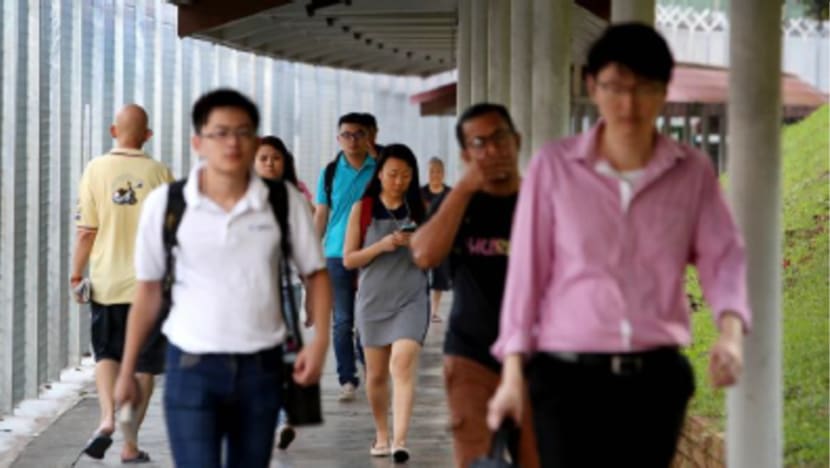Commentary: A hotter Singapore will change how we work and live
Warm conditions are expected to persist, but air-conditioning may hurt us in the long run. This Earth Day, consider how people perceive and seek comfort from the heat for solutions too, say Yale-NUS College’s Jean Liu and Nanyang Business School’s Georgios Christopoulos.

Two people shield themselves from the sun under an umbrella in Clementi. (File photo: CNA/Gaya Chandramohan)

This audio is generated by an AI tool.
SINGAPORE: If you found the recent hot weather in Singapore unbearable, there’s bad news: Things are expected to get worse. There will be more days of extreme heat in the decades to come, according to the National Climate Change Study released earlier this year.
In Europe, some are debating if siestas, or extended midday breaks to sleep or rest, could help them cope with deadly heatwaves. While Singapore is not accustomed to - or likely too pragmatic to embrace - the siesta, it is timely to consider if we have to rethink our work and lifestyles in a warmer future.
Liveability in urban Singapore will surely take a hit as temperatures rise, especially given the notorious urban heat island effect. Already, some schools have relaxed rules on uniforms, such as allowing students to wear their physical education (PE) attire instead.
The heat changes how people experience their city and neighbourhood.
Businesses might need to adapt their schedules if they involve outdoor activities. To reduce the risk of heat stress, the Ministry of Manpower requires employers to monitor the Wet Bulb Globe Temperature and provide regular breaks for workers engaged in outdoor physical labour.
Would more heartland shops shutter during the hottest hours of the day if their customers are less likely to head out of the house? Even workers tucked away in air-conditioned offices during the week might need to change their weekend routines, possibly intensifying night activities to make up for “lost” day-hours.
THE COST OF EXTREME HEAT
These foreshadow a future with greater disruptions to society. A recent study by the National University of Singapore estimated that by the year 2035, escalating temperatures would cost the local economy S$2.2 billion (US$1.6 billion) annually from reduced productivity.
Aside from economic costs, there is a broad range of heat-related symptoms, from purely medical (such as cardiopulmonary) to psychological (such as fatigue and anxiety), and even social (such as increased irritability and aggressive behaviour).
A growing number of buildings in Singapore now include design features to moderate the urban heat island effect, such as building orientation roof-top gardens or use reflective paint.
But the average person would still likely turn the air-conditioning on at full blast, contributing to further global warming in the long run.
This suggests that we need solutions that reflect a deep understanding of human behaviour and psychology.
UNDERSTAND HEAT PERCEPTION AND BEHAVIOUR
Understanding how people perceive temperature in a subjective manner and how they behave to minimise heat stress in hot weather can provide city planners with new tools to regulate the heat.
We know that walking in the shade is preferred to walking under the sun, but to what extent?
In a study that one of us (George) conducted at Nanyang Technological University, researchers found that walking 100m in the shade was comparable to walking 86m under the sun. The same study also estimated that sheltered walkways around MRT stations under the Land Transport Authority’s Walk2Ride initiative could make the stations feel 14 per cent closer.
This could help determine how much farther people are willing to walk to avoid the sun and plan sheltered paths.

Other research tells us that factors unrelated to the weather can influence our perception of heat. Rooms with cool lighting feel up to 3 degrees Celsius lower than rooms with warm lighting while people in quiet surroundings are better able to tolerate heat.
Spaces that are interesting, beautiful, or natural can “feel” less warm or might be preferred. We might bear with the heat at outdoor hawker centres instead of indoor eateries for a more authentic local dining experience.
Mist spraying systems can also certainly help in reducing perceived temperature. However, given their cost, and similar to shading, their effectiveness can be optimised by strategically positioning or adjusting their direction or droplet size to reflect human psychology and physiology.
If we consider the full suite of factors that influence heat perception, we can regulate the comfort of our environments without adding stress to global warming.
A NEW WAY OF THINKING ABOUT SUSTAINABILITY
As our days get hotter, we may not even get respite at night. The National Climate Change Study projected more warm nights where temperatures equal or exceed 26.3 degrees Celsius.
It is a stark reminder of how Singapore needs to not just adapt to rising temperatures, but to do so in a sustainable manner.
While sustainability typically focuses on energy consumption and carbon emissions, a comprehensive approach must also consider the nation’s residents and how people go about their daily lives. Failure to do so could result in plans backfiring.
When we integrate human-centred solutions alongside sustainable approaches, we can forge ahead to build a more comfortable city for everyone. The heat is on and it’s time for us to rise to the challenge.
Jean Liu is an Adjunct Assistant Professor at Yale-NUS College and the NUS Yong Loo Lin School of Medicine. She runs Insights Bridge, a consultancy specialising in research and behavioural insights. Georgios Christopoulos is Associate Professor and Assistant Dean at the Nanyang Business School, and Director of the Decision, Environmental and Organizational Neuroscience (DEON) Lab.




















